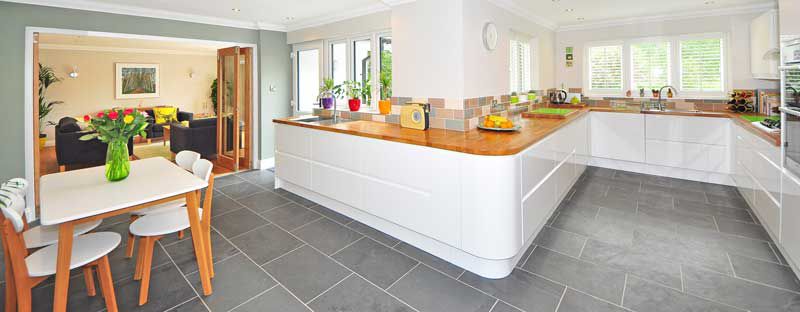Thinking about sealing your ceramic floor tiles? If you are, this info might save you a fortune and help you avoid a heap of frustration. Before you do anything, it’s important to know why you want to seal and if sealing will solve your problem long term.
Here’s 7 reasons why you might want to seal your ceramic tiles (often in desperation) and then wished you never did...
1. Cleaning
Are you wanting to seal ceramic tiles because they're difficult to clean?
Ceramic floor tiles can be difficult to clean with traditional methods like a mop and bucket. Our instinct to solve this problem is normally to use stronger cleaning chemical products, more of them and more often. But this path often makes the problem worse with more chemical residue, faster re-soiling and cleaning becoming more difficult. Regardless of the cleaning challenges, it is safe to say that sealing ceramic floor tiles is not the best solution. Ceramic floor sealers are hit and miss, they need a lot of maintenance too, so the hope of achieving a maintenance-free ceramic floor with a floor sealer in my experience just doesn’t happen.
The best thing to do is treat this problem as a cleaning issue and investigate better cleaning methods such as floor scrubbers, floor care cleaning chemicals, professional mopping systems, microfibre and advanced agitation methods. You will need to find a sustainable process that includes chemical, agitation and extraction/soil removal that suits your level of traffic and cleaning frequency. You may also need to do a restoration clean before you restart your maintenance program and test different process combinations.
In frustration, you might feel like you’ve tried everything to clean this #$%&* floor and failed. Thinking outside the mop and bucket box is often where the solution lies. You might have to invest some money but it will be much cheaper than sealing. Your floor’s cleaning answer will cost more than a cheap mop, bucket and chemical though and there may be some trial and error along the way.
XO2's Top Ceramic Tile Maintenance Products
2. Looks
Do you want to seal your ceramic floor tiles for a better appearance?
Looks is one of the biggest reasons why many people try to seal their ceramic floor tiles. Just remember, ceramic floor tiles are not made to be sealed. If your floor surface is dull and you want it glossy or if it’s glossy and you want it dull, there is no permanent solution other than re-tiling. If you choose to seal, despite what some floor sealer salespeople may say, expect that you will have to re-seal often, the look you get may not be ideal, and floor sealing applicator marks can be difficult to avoid especially in open areas with a lot of light, regular buffing will be needed and the overall cleaning and maintenance will take longer and be more expensive. Friends, proceed with caution.
3. Slip Problems?
Sealing for more grip and a better slip coefficient?
When the incorrect ceramic floor tile is chosen for an application, slip problems may occur. If you find yourself in this situation and are searching for an answer the bad news is there are very few successful long-term solutions available.
Firstly, non-slip treatments which etch or microscopically texture floors can be used but may in some instances affect the look of a tile by making it dull. These treatments are extremely dangerous to use (using crazy acids) and can also make the floor surface very difficult to clean.
Secondly, non-slip sealers may be used. We do not recommend any sealing of ceramic tiles. When using a non-slip floor sealer you need to expect that reapplication may be required often and a new cleaning problem can be created.
Thirdly, the ultimate solution is to re-tile with a suitable tile or surface for the application.
4. Staining
Trying to fix a tile staining problem?
Genuine ceramic floor tiles do not stain, so sealing will not improve stain protection. Sealing of grout however may be a good decision that will help you reduce floor maintenance. Using a product like Pro Seal Ultra is ideal for grout.

5. Damage
Wanting to seal a ceramic floor tile to fix or cover some damage?
Ceramic floor tiles are very durable and difficult to damage. All ceramic floor sealers are softer than the actual ceramic tile. That means a sealed ceramic tile surface will damage faster in comparison to bare tile. It will also need more maintenance to achieve a consistent look. There is often an expectation that floor sealers are as tough as tiles but that’s not true. Protective coatings are also referred to as sacrificial coatings. They are there to do a job and be reasonably easy to repair and replace while protecting the original surface.
6. Adhesion
Wanting to seal your ceramic floor tile surfaces because an existing floor sealer is peeling off?
Sealers or coatings do not adhere or stick well to ceramic floor tiles. Even if you can find a sealer to adhere to the surface, it will most likely peel or wear very quickly, usually in 2-12 months.
7. Maintenance
Tired of the hard work of keeping your ceramic tiles looking clean and attractive?
A ceramic floor tile with a sealer/coating requires more work and cost to maintain and clean than the bare tile itself. This is because the sacrificial floor sealer coatings are softer than the tile and will be more affected by traffic, spills and day-to-day wear and tear. This means regular repair and replacement of the sealer will be required.
Many try… few succeed… and the rare success rarely lasts.
While many people try, very few people succeed in sealing ceramic floors and getting the results they want. Even when in the few cases a floor sealer is successfully laid it almost never lasts and expectations are disappointed. Everyone who tries to seal ceramic floor tiles has very good reasons for doing so, but whether they do it themselves or have a professional complete the work, the same problems come up time and time again.|
“Unfortunately floor sealers are not an adequate substitute for good tile selection.”
Floor sealers that act as a protective, easier-to-maintain coating over a floor have their place. In fact, XO2 has been responsible for supplying floor sealers that have covered over 1 million square metres of floor surfaces. We believe in floor sealers used in the right application for the right reasons. But the very low rate of success of floor coatings on ceramic tiles makes recommending them too expensive and problematic for us.
But what if your ceramic floor sealer has a warranty?
Regardless of the manufacturer’s promises.... and many manufacturers promise the world in this space, proceed with caution. Read any warranty, take note of the conditions and also be aware of what the warranty covers. Most warranties (especially long ones like 5, 10 and 15 year ones) require such a high standard of maintenance with very select (and expensive) products along with sometimes yearly or 6 monthly reapplications of the sealer they make the conditions almost impossible or at best very expensive to meet. Then if you comply with these difficult conditions, you will probably find that the manufacturer will only cover you for the replacement of the sealer, not a refund for it and not for any labour costs. That’s a problem because the cost of labour to fully strip, re-prepare the floor and seal again far exceeds the cost of the sealer. So most warranties don’t mean very much at all.
If you decide to seal we do wish you the very best and hope things work out for you.
To increase your chances of success consider this little bit of advice before you start…
1. Testing
Do lots of tests over a suitable period of time to ensure you are satisfied with the result.
2. Etching (or microscopic texturing)
You may have to etch the surface of the tile to ensure better adhesion of the sealer to the surface. This is risky because you can permanently change the look of the tile. This won’t matter if the floor sealer works but if it doesn’t and you want to strip the sealer off and return the floor back to normal it probably won’t look the same. The other problem you will have with an etched ceramic floor tile after you strip a sealer is that even if the tile looks the same it will be much harder to clean than before.
What about sealing the grout?
Ceramic tiles were never made to be sealed but there is a strong argument for sealing those porous grout lines that tend to collect and hold ugly dirt and soils. It’s best not to use a coating for this but instead a penetrating or impregnating sealer like Pro Seal Ultra. This basically acts on a porous hard surface like a fabric protector does on a couch. You can’t see it but it repels moisture and stains. There are some wonderful grout-sealing application tools that make this job easier. And if you get some grout sealer on the tile surface, with the right product, it should just wipe away easily if you remove it immediately.
Let us know how you go.
Whether you seal or don’t seal let us know how you go, we’d love to hear from you. I hope this information helps. Feel free to call our customer care team on 1300 123 499, if you require any help or advice on the floor care program for your business or facility. If you’re interested in learning more about XO2’s range of professional floor sealers you can visit the XO2 floor sealers and coatings online store page.
Have a great day.

David Blamire, CEO at XO2
David is one of Australia's leading cleaning industry innovators. He's spent his entire working life solving cleaning challenges others thought were impossible. He's best known for his product creation and development skills along with a deep knowledge of business operations and all things ERP. In his spare time, David's a keen fisherman and adventurer. And he doesn't mind if you call him Davo.
Get in touch with David at www.xo2.com.au. He works from XO2's national headquarters and manufacturing centre in Queensland, Australia.